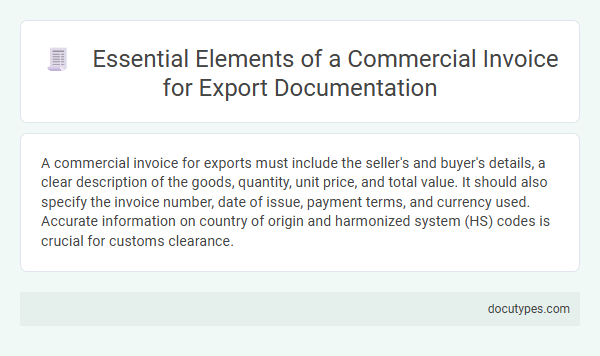A commercial invoice for exports must include the seller's and buyer's details, a clear description of the goods, quantity, unit price, and total value. It should also specify the invoice number, date of issue, payment terms, and currency used. Accurate information on country of origin and harmonized system (HS) codes is crucial for customs clearance.
Introduction to Commercial Invoices in Export
A commercial invoice is a critical document used in international trade to detail the transaction between the exporter and importer. It serves as proof of sale and provides essential information for customs clearance, including product descriptions, quantities, and prices. Accurate commercial invoices help ensure smooth export processes and compliance with international regulations.
Importance of Accurate Export Documentation
A commercial invoice for exports must include essential elements to ensure smooth customs clearance and accurate payment processing. Accurate export documentation is crucial in avoiding delays, fines, and disputes.
- Buyer and Seller Information - Clearly listing the names and addresses of the exporting seller and importing buyer is critical for identification and correspondence.
- Description of Goods - Detailed descriptions including quantity, weight, and value help customs authorities assess duties and verify the shipment contents.
- Export Terms and Payment Details - Specifying Incoterms and payment terms defines responsibilities and expectations between trading partners, preventing misunderstandings.
Essential Seller and Buyer Information
A commercial invoice for exports must include essential seller information such as the company name, address, and contact details. This ensures the buyer and customs authorities can verify the origin of the goods efficiently.
Buyer information is equally critical, requiring the full name, address, and contact details of the recipient. Including accurate buyer details helps prevent delays in customs clearance and ensures smooth delivery of your shipment.
Detailed Description of Goods
The Detailed Description of Goods is a critical element in a commercial invoice for exports. It provides clear identification and categorization of the products being shipped, ensuring smooth customs clearance.
This description should include key attributes such as quantity, quality, size, weight, and material composition. Accurate details minimize the risk of delays, fines, or shipment rejection during international trade processes.
HS Codes and Product Classification
A commercial invoice for exports must include precise HS Codes and accurate product classification to ensure smooth customs clearance. HS Codes help customs authorities identify the nature of the goods and apply the correct tariffs and taxes. Your invoice should clearly state these codes to prevent delays and avoid penalties during international shipping.
Quantity and Unit of Measure
What are the essential elements related to quantity and unit of measure in a commercial invoice for exports? The commercial invoice must clearly specify the exact quantity of goods being shipped. Your invoice should also include the correct unit of measure to avoid any confusion during customs clearance or logistical handling.
Value and Currency Details
| Essential Element | Description |
|---|---|
| Value Details | The commercial invoice must clearly state the total value of the goods being exported. This includes the price of each item, any discounts applied, and the overall amount payable. Accurate reporting of the value is crucial for customs assessment and duty calculation. |
| Currency Information | Specify the currency in which the transaction is conducted. This helps avoid confusion during international trade and ensures proper conversion rates are applied. Use standard currency codes like USD, EUR, or GBP for clarity. |
| Importance for Your Shipment | Providing precise value and currency details on your commercial invoice aids in smooth customs clearance, preventing delays and potential additional fees. This information is vital for compliance with export regulations and accurate tariff imposition. |
Terms of Sale: Incoterms and Payment
A commercial invoice for exports must clearly define the terms of sale to avoid disputes and ensure smooth transaction processing. Understanding Incoterms and payment conditions helps you manage responsibilities and risks effectively.
- Incoterms specification - Defines the responsibilities of the buyer and seller regarding transportation, insurance, and delivery obligations.
- Payment terms - Outlines the agreed method and timeline for payment, such as advance payment, letter of credit, or open account.
- Currency and payment instructions - Specifies the currency used and detailed instructions to facilitate timely and accurate payment.
Shipping and Delivery Information
Shipping and delivery information is crucial in a commercial invoice for exports to ensure timely and accurate transportation of goods. Clear details help avoid delays and facilitate smooth customs clearance processes.
- Consignee Details - This includes the name, address, and contact information of the recipient to guarantee precise delivery.
- Shipping Method - Specify whether the transport is by air, sea, road, or rail to align with logistical arrangements.
- Delivery Terms (Incoterms) - Clearly state the agreed terms to define responsibility and risk between buyer and seller during shipment.
Your commercial invoice must include accurate shipping and delivery information to prevent complications in export transactions.
What Are the Essential Elements in a Commercial Invoice for Exports? Infographic

